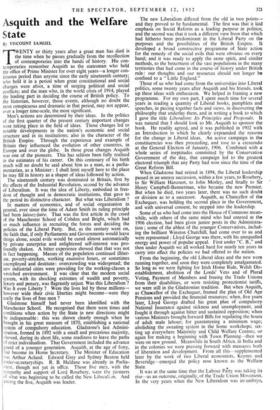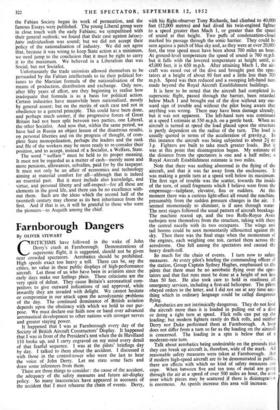Asquith and the Welfare State
By VISCOUNT SAMUEL
TWENTY or thirty years after a great man has died is the time when he passes gradually from the recollection of contemporaries into the hands of history. His con- temporaries remember Asquith as the statesman who held the office of Prime Minister for over eight years—a longer con- tinuous period than anyone since the early nineteenth century; who held it in a period when great constitutional and social changes were afoot, a time of surging political and social conflicts; and the man- who, in the world crisis of 1914, played the leading _part in deciding the course of British policy. To the historian, however, those events, although no doubt the most conspicuous and dramatic in that period, may not appear, over a longer time-scale, the most significant. Men's actions are determined by their ideas. In the politics of the first quarter of the present century important changes were taking place in the field of ideas. Those changes led to notable developments in the nation's economic and social structure and in its institutions; also in the character of the British Empire. Through the experience and example of Britain they influenced the evolution of other countries, in Europe and over the globe. In those great changes Asquith was one of the pioneers. This has seldom been fully realised in the estimates of his career. On this centenary of his birth much will no doubt be said about him as a man, as a parlia- mentarian, as a Minister :. I shall limit myself here to the place he may fill in history as a shaper of ideas followed by action.
The nineteenth century was dominated in Britain, first by the effects of the Industrial Revolution, second by the advance of Liberalism. It was the idea of Liberty, embodied in free- dom of thought and in democratic institutions, that gave to the period its distinctive character. But what was Liberalism ? In matters of economics, and of social organisation in general, ever since the time of Adam Smith its ruling principle had been laissez-faire. That was the first article in the creed of the Manchester School of Cobden and Bright, which had so much influence in recruiting the forces and deciding the policies of the Liberal Party. But, as the century went on, the faith that, if only Parliaments and Governments would leave things alone, social evils would be cured almost automatically by private enterprise and enlightened self-interest was pro- foundly shaken. A bitter experience showed that that was not in fact happening. Masses of the population continued illiter- ate, poverty-stricken, working excessive hours, or sometimes unemployed and destitute : overcrowding was widespread; the new industrial cities were providing for the working-classes a wretched environment. It was clear that the modern social system, with its shocking extremes of wealth and poverty, luxury and penury, was flagrantly unjust. Was this Liberalism ? Was it even Liberty'? Were the lives led by those millions— however wide their civic liberties might become—were they really the lives of free men ? Gladstone himself had never been identified with the Manchester School. He recognised that there were times and conditions when action by the State in new directions might be indispensable : this was shown clearly enough when he brought in his great measure of 1870, establishing a national system of compulsory education. Gladstone's last Admini- stration, formed in 1892 with a small and precarious majority, showed, during its short life, some readiness to leave the paths of strict individualism. That Government included the advance guard of a younger generation. Asquith, at the age of forty, had become its Home Secretary. The Minister of Education was Arthur Acland. Edward Grey and Sydney Buxton held under-secretaryships. R. B. Haldane was already in Parlia-, ment, though not yet in office. Those five men, with the sympathy and support of Lord Rosebery, were the pioneers of what was beginning to be called the New Liberalism. And among the five, Asquith was leader. The new Liberahsm differed from the old in two points— and they proved to be fundamental. The first was that it laid emphasis on Social Reform as a leading purpose in politics; and the second was that it took a different view from that which had hitherto been predominant in the Liberal Party on the purposes and the possibilities of the British Empire. It developed a broad constructive programme of State action for the remedy of the social evils that were obvious on every hand; and it was ready to apply the same spirit, and similar methods, to the betterment of the vast populations in the many territories that had come in the course of history under British rule : our thoughts and our resources should not longer be confined to a " Little England."
Those of us who had come from the universities into Liberal politics, some twenty years after Asquith and his friends, took up these ideas with enthusiasm. We helped in framing a new programme. For my own part, I spent much time for several years m reading a quantity of Liberal books, pamphlets and speeches, in piecing together facts and views, in discovering the philosophy that underlay them, and in writing a book to which 1 gave the title Liberalism: Its Principles and Proposals. It was natural that I should look to Mr. Asquith to sponsor the book. He readily agreed, and it was published in 1902 with an Introduction in which he clearly expounded the reasons for the change in Liberal ideas. An active campaign in the constituencies was then proceeding, and rose to a crescendo at the General Election of January, 1906. Combined with a whole series of ineptitudes committed by the Conservative Government of the day, that campaign led to the greatest electoral triumph that any Party had won since the time of the Great Reform Bill.
When Gladstone had retired in 1894, the Liberal leadership passed in an uneasy succession, within a few years, to Rosebery. to Sir William Harcourt, to John Morley, and finally to Sir ' Henry Campbell-Bannerman, who became the new Premier. But when he died, two years later, there was no such doubt or division as to a successor. Asquith, as Chancellor of the Exchequer, was holding the second place in the Government, and with universal consent, he stepped into the leadership.
Some of us who had come into the House of Commons mean- while, with others of the same mind who had entered at the 1906 election, had been given junior posts in the Administra- tion ; some of the ablest of the younger Conservatives, includ- ing the brilliant Winston Churchill, had come over to us and were represented ; Lloyd George was there, with his unequalled energy and power of popular appeal. First under "C. B.," and then under Asquith we all worked hard for nearly ten years to carry into effect the policies we had offered to the nation.
From the beginning, the old Liberal ideas and the new were running together, and soon they were completely amalgamated. So long as we were fighting for Irish Home Rule, Welsh Dis- establishment, abolition of the Lords' Veto and of Plural Voting, Payment of Members and freeing the Trade Unions from their disabilities, or were resisting protectionist tariffs, we were still in the Gladstonian tradition. But when Asquith, as Chancellor of the Exchequer, framed the plan of Old Age Pensions and provided the financial resources; when, five years later, Lloyd George drafted his great plan of compulsory National Insurance against sickness and unemployment, and fought it through against bitter and sustained opposition; when various Ministers brought forward Bills for regulating the hours of adult male labour; for guaranteeing a minimum wage; abolishing the sweating system in the home workshops; set- ting up everywhere Maternity and Child Welfare Centres; or again for making a beginning with Town Planning—then we were on new ground. Meanwhile in South Africa, in India and in the colonies we were pressing forward with measures both of liberation and development. From all this—supplemented later by the work of two Liberal economists, Keynes and Beveridge—emerged the policy now known as the Welfare State. It was at the same time that the Labour Pa7rty was taking its rise—as an outcome, originally, of the Trade Union Movement. In the very years when the New Liberalism was in. embryo,
the Fabian Society began its work of permeation, and the famous Essays were published. The young Liberal group were in close touch with the early Fabians; we sympathised with their general outlook; we found that their case against laissez- faire individualism was sound; but we did not accept their policy of the nationalisation of industry. We did not agree that, because it was wrong to keep State action at a minimum, we need jump to the conclusion that it must be right to carry it to the maximum. We believed in a Liberalism that was Social, but not Socialist.
Unfortunately the trade unionists allowed themselves to be persuaded by the Fabian intellectuals to tie their political for- tunes to the Mandan formula of the nationalisation of the means of production, distribution and exchange. Only now, after fifty years of effort, are they beginning to realise how inadequate that formula is as a basis for political action. Certain industries have meanwhile been nationalised, mostly by general assent; but on the merits of each case and not in obedience to a general principle. This could have been done, and perhaps much sooner, if the progressive forces of Great Britain had not been split between two parties, one Liberal, the other Socialist. And now that, within the same period, we have had in Russia an object lesson of the disastrous results, on personal liberties and on the progress of thought, of com- plete State monopolisation, perhaps the leaders and the rank and file of the workers may be more ready to re-consider their position, and to accept, instead of a Socialist, a Welfare, State. The word " welfare " must be held to its proper meaning. It must not be regarded as a matter of cash—merely more and more pensions, allowances, subsidies, paid for by the taxpayer. It must not only be an affair of economics and technology aiming at material comfort for all—although that is indeed an essential part. But it must include also knowledge, and virtue, and personal liberty and self-respect—for all these are elements in the good life, and there can be no excellence with- out them. Such are the ideas which the second half of the twentieth century may choose as its best inheritance from the first. And if that is so, it will be grateful to those who were the pioneers—to Asquith among the chief.



































 Previous page
Previous page